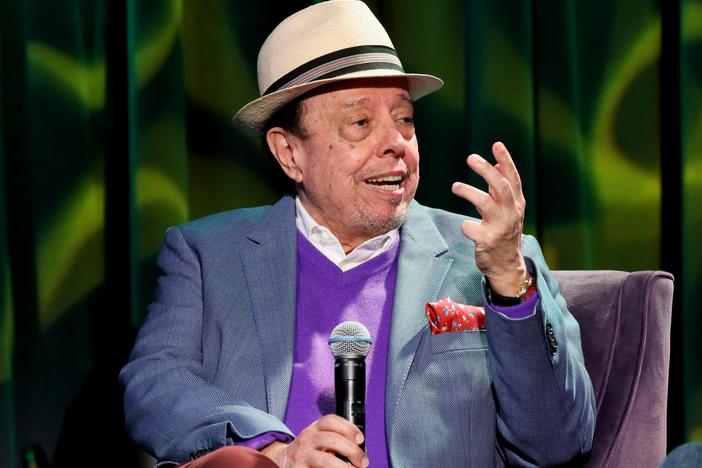Section Branding
Header Content
Fania Records Co-Founder Johnny Pacheco Dies At 85
Primary Content
Pacheco was a prolific songwriter and musical arranger whose work helped fuel the careers of Celia Cruz and Ruben Blades.
Transcript
STEVE INSKEEP, HOST:
Johnny Pacheco has died. He'd been hospitalized with pneumonia the night before. The 85-year-old flautist, composer and arranger was celebrated as a trailblazer of salsa music. Here's NPR's Felix Contreras.
FELIX CONTRERAS, BYLINE: To truly understand Johnny Pacheco's contribution not only to music but also to the Latino experience here in the United States, you need to know a little bit about Fania Records.
(SOUNDBITE OF SONG, "QUIMBARA")
CELIA CRUZ: (Singing in Spanish).
CONTRERAS: The label was started by Pacheco and his divorce attorney, Jerry Masucci, in 1964, primarily to record New York City bands that played their favorite kinds of Cuban dance music, which had dried up because of the U.S. economic embargo on the island. As Pacheco sold their records from the trunk of his car to neighborhood record shops in Latin New York, the U.S. was also undergoing a profound national transformation as civil rights for African Americans began to extend to Latino communities. And very soon, the Fania sound was not only a musical revolution, it was also the sound of a political awakening as Afro Latino folkloric rhythms like Afro Cuban guaguanco, Dominican merengue and Puerto Rican bomba all became part of Pacheco's musical palette as the principal architect of the Fania sound. And as he told me in a report about Fania Records in 2006...
(SOUNDBITE OF ARCHIVED NPR BROADCAST)
JOHNNY PACHECO: You know, the Black had Motown. The white Anglo had their own sound. And here we come with a different sound of Latin music.
(SOUNDBITE OF SONG, "GUAGUANCO PA'L QUE SABE")
PACHECO: (Singing in Spanish).
CONTRERAS: Johnny Pacheco was born in the Dominican Republic in 1935 and moved with his family to New York when he was 11 years old. Already a budding musician, he continued his music studies and was admitted to The Juilliard School of music, where he studied percussion and arranging, after which he was soon an in-demand studio percussionist on American pop music records. But in an early form of niche marketing, Pacheco soon applied his vast musical skills to popular dance music aimed at the people who were living around him. His first taste of success came in 1960 with a dance craze called the pachanga.
(SOUNDBITE OF SONG, "CACHITA")
PACHECO: (Singing in Spanish).
CONTRERAS: His band was offered international tours in Europe, Asia and Latin America while becoming one of the first Latin bands to play the Apollo Theater in New York. It was those early music experiences in the music business that gave him the confidence to take on running a record label. And for a little more than a decade, Fania Records built a stable of star vocalists and instrumentalists that included Celia Cruz, Ruben Blades, Hector Lavoe and Ray Barretto, all of whom later formed the Fania All-Stars with others on the label under Johnny Pacheco's direction. The true magic of Johnny Pacheco's gift was not just his prowess as a label chief, musical arranger or cultural visionary. It was how all of those skills were put to use in the service of others for Fania and well into his later years as he mentored countless young musicians and arrangers. Felix Contreras, NPR News.
(SOUNDBITE OF JOHNNY PACHECO'S "DESAFINADO") Transcript provided by NPR, Copyright NPR.
Bottom Content



